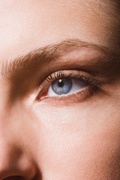The cornea is the clear window that covers the front of the eye, like the crystal on a watch. If this tissue becomes cloudy, it can cause your vision to become blurry. Light first enters the eye through the cornea, which focuses the light onto the lens. The lens fine tunes the focus as it passes the light image on to the retina where it is converted to electrical impulses and sent to the brain.
The cornea must remain clear to allow light to pass through so your vision will be clear and so the light will be focused correctly. The cornea provides between 65 and 75 percent of the focusing power of the eye. A variety of disorders called corneal dystrophies can affect the cornea by causing a build-up of cloudy material. There are over 20 different dystrophies that can cause some part of the cornea to become cloudy. These are some of the traits the corneal dystrophies have in common:
• Usually inherited
• Can occur in otherwise healthy men or women
• Both eyes are affected equally
• Gradually get worse over time
• Usually begin in one layer of the cornea and later spread into some or all of the other four layers
• Are not caused by factors such as diet or injury to the eye
• Do not usually affect other parts of the body
• Are not usually related to diseases affecting other parts of the body
Corneal dystrophies have widely varying symptoms. Some dystrophies cause severe loss of vision, while others are not noticed unless they are spotted during a routine eye exam. Some dystrophies can cause pain in the eye without causing a loss of vision.
Another condition that can cause clouding of the cornea is a deficiency of Vitamin A and protein in the diet. This condition, which is called karatomalacia, can cause the cornea and the sclera (the white part of the eye) to become dry. This can lead to ulcers and bacterial infections on the surface of the eye. It can also affect the tear glands, decreasing the amount of tears that are produced.
Another cause of a cloudy cornea is guttata or guttae, which means droplets. Very small, clear bumps can appear on the inside back surface of the cornea. These droplets are common in older patients and usually do not cause any problems. But in some cases, the droplets become very numerous which can cause a cloudy swelling in the cornea.
It’s important to note that clouding of the cornea should not be confused with cataracts. Cataracts form when lens of the eye becomes cloudy. So while the result may sound similar, the part of the eye affected by cataracts is completely different from a cloudy cornea.
Treatment for a cloudy cornea varies depending on the location and cause of the cloudiness. Severe cases may be treated with corneal transplant surgery.
Sources:
National Eye Institute
Cornea Research Foundation of America
Merck Manuals Online
Eye Smart





Add a Comment2 Comments
MAXIDEX DEXAMETHASONE WARNING
I had eye surgery and in the post-op pack was MAXIDEX(dexamethasone) drops by ALCON LABS.
Two days later I was BLIND
Use Google and enter EPOCRATES MMAXIDEX REACTION to verify
Or call 800-757-9195
DEATH COUNT is on ehealthme.com
September 26, 2010 - 3:16amThis Comment
I am so sorry. Can you tell us more about your story? I did look up the reports on dexamethasone, and did not see blindness as a possible side effect (or that it had occurred as a result of this drug being used as directed).
Can you tell us more about the type of surgery you had, if there were any complications from your eye surgery, and how you were able to identify the post-op eye drops as the cause to your blindness, instead of the eye surgery itself? What have your doctors or other health care professionals said about your case? What condition did you have that lead to eye surgery, and what type of surgery did you have?
Do you have any resources that can help with your blindness, or do you need any help with information or resources that we can provide?
September 26, 2010 - 7:46pmThis Comment